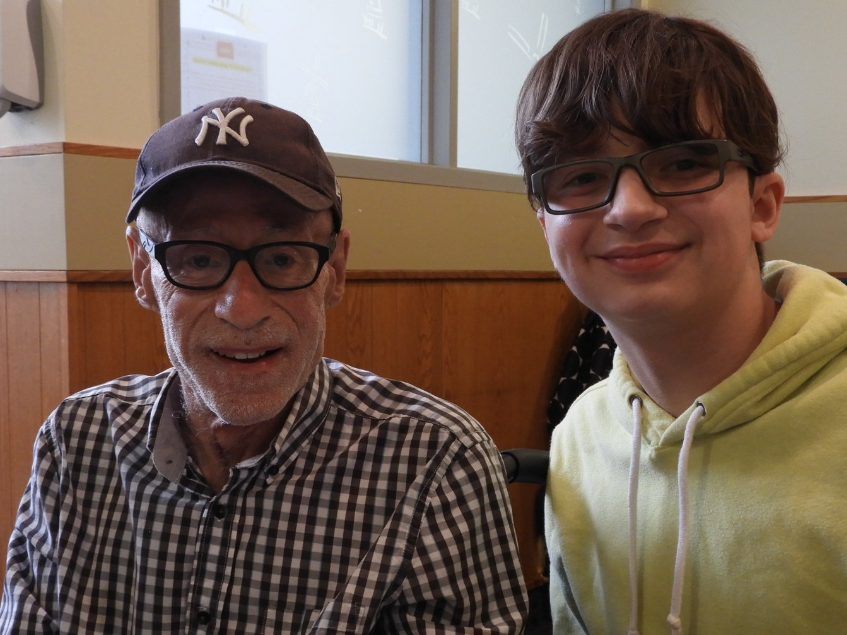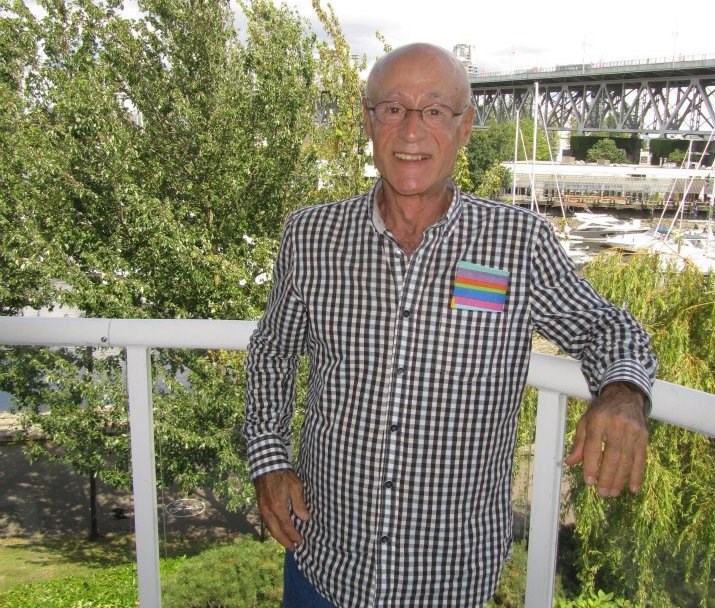He was a Â鶹´«Ă˝Ół»city councillor, a prominent gay activist, a passionate urbanist.
Alan Herbert, who died April 11 after living with AIDS for decades before Parkinson's disease and dementia took hold of him, lived a multi-faceted life driven by a sense of social justice and building community.
He was 78.
Family and friends remembered Herbert April 14 at the Schara Tzedeck Cemetery in Burnaby, where one of his daughters, Keren Mitchell, paid tribute to a father she described as "complex and vibrant."
"Perhaps Alan's greatest regret is that his public life and personal struggles took him away from our family for much of our childhoods," Mitchell said. "It brings me great comfort to know that he was away fighting for dignity and humanity for the queer community during that time."
Herbert's fights were centred on educating the uneducated and lifting and protecting a community ravaged by AIDS — a fight that became very personal in the 1980s with news that he was HIV-positive.
AIDS Vancouver
As the third president of AIDS Vancouver, he was instrumental in securing municipal and federal government money for the organization's groundbreaking work in HIV health education, support services and harm reduction.
"Alan was extremely proud of the fact that AIDS Â鶹´«Ă˝Ół»was the first community organization dedicated to the battle against AIDS that received funding from any level of government in Canada," Mitchell said.
During his term on the board, Herbert won approval to have AIDS Â鶹´«Ă˝Ół»receive funds via the United Way. The organization also brought in $100,000 from a fundraiser connected to the musical CATS.
Through his work with AIDS Vancouver, Herbert founded McLaren House, Canada's first housing facility for people with AIDS. He was also behind the development of Canada's first pamphlet on safer sex.
"He worked tirelessly to fight stigma and ensure that local media coverage of the disease would focus on health, avoiding sensationalism and avoiding stories that would demonize the illness or promote fear," Mitchell said.
Herbert became HIV-positive when he and his wife were going through a divorce. His son, Jason, was 13 then and remembers the stigma associated with AIDS and the belief that his father was unlikely to have a long life.
"My parents always remained on good terms, but he was dealing with a lot of things in the community and personally, and so we had probably regretted that we didn't have more closer contact during my teen years," Jason said Monday in an interview.
"But certainly, and particularly late in life, he expressed a very strong attachment to family, to his kids, to his grandkids. He was very proud of everyone's accomplishments. That was really important to him."
Gordon Price
Herbert grew up in Kerrisdale, attended Magee high school and graduated from the University of B.C. in 1969 with a master's degree in geography, specializing in urban planning. He worked for the Canada Mortgage and Housing Corporation before his activism.
That activism eventually led him to politics — first volunteering in 1986 on Gordon Price's successful campaign to become Vancouver's first openly gay city councillor. A decade later, Herbert launched a campaign with the NPA and was elected to council in 1996, joining Price in the chamber.
Price shared Herbert's passion for politics, cities and being a voice for the gay community.
"I have kind of lost count of the different roles he played, but he found them," said Price, referring to AIDS Â鶹´«Ă˝Ół»and Â鶹´«Ă˝Ół»Pride Society, where Herbert served as a board member and chairperson.
"And he was very much cognizant of the special nature of the West End and the need to maintain or even further its growth as a gay community, and that you just couldn't take that for granted."
Fountainhead pub
During his term on council, Herbert fought and won a highly politicized battle to get Vancouver's first 2SLGTBQIA+ pub, the Fountainhead, a liquor licence. Michel Duprat, the current owner of the Fountainhead, reflected Monday on Herbert's actions to help the pub.
"He was definitely in the Fountainhead's corner," Duprat said. "Alan brought this to the forefront to have people recognize that this was a unique part of Â鶹´«Ă˝Ół»— that the West End was very much a different culture than what was developing on Granville Street, with a lot of the nightclubs and stuff."
In her eulogy, Herbert's daughter, Keren, said that her father's actions helped pave the way for more queer spaces in the Davie Village. She said Herbert's commitment to city building extended across Vancouver, promoting streetcars and recognizing Chinatown's history.
"His vision of Â鶹´«Ă˝Ół»was as vibrant, fun, and spirited as he was," she said.
Herbert also served as chairperson of the Â鶹´«Ă˝Ół»City Planning Commission. In his later years, he founded a group for older gay men called "gay and grey," which his son said he was proud to do, knowing so many gay men his age needed support.
In 2002, he was awarded the Queen Elizabeth II's Golden Jubilee medal in recognition of his many contributions, and in 2004 he received Xtra West's lifetime achievement award. In 2015, he was honoured with AIDS Vancouver's Red Ribbon Award.

The Jacksons, Lady Gaga, Erasure
Herbert's other passions, which were less publicized, were travelling and photography.
He had a map in his home coloured with pins to mark all the places he had visited. In 1976, he was the main photographer for an exhibition called "Israel, the Timeless Settlement," which was mounted in the UN-Habitat forum.
He later created photo collages of Expo 86 and of his trip to South Africa and Namibia, which his children displayed at the care home where Herbert spent his final days.
He loved music, too, seeing the Jacksons, Lady Gaga and Erasure with his family.
"In the days before his death, Jason, [my sister] Alisa and I created a playlist of many of his favourite songs, which I played and sung to him in his final days," Keren said in concluding her eulogy.
"Some of the songs seemed to break through to wherever he was, and he would smile or shed a tear. I believe he felt loved by his kids while he made his final journey."




